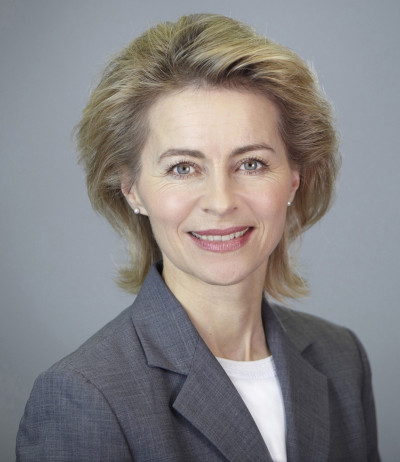Former German Defense Minister Ursula von der Leyen, a member of Merkel‘s conservatives, has been confirmed as president-elect of the EU Commission. But just who is she? Deutsche Welle profiled the Brussels-born doctor and her time in Berlin.
The Christian Democrat (CDU), who was introduced to the Berlin political stage by Chancellor Angela Merkel in 2005 — and who was once briefly treated as a potential successor to Merkel — has been confirmed head of the European Commission, making her the Commission‘s first ever female chief.
Ministerial posts Initially, the mother of seven held the post of family minister, between 2005 and 2009. With her sometimes unconventional style, she sent clear signals to the political establishment in Berlin. She initiated, for example, a parental assistance program („Elterngeld“) and oversaw a nationwide expansion of childcare by providing substantial financial support from the German government.
In 2009, then serving in Merkel‘s second Cabinet, von der Leyen, a trained physician, became health minister. In December 2013, she switched to the Ministry of Defense. She remained in charge even after the complicated government formation process in the wake of the 2017 federal elections.
Mover and shaker :As defense minister, von der Leyen quickly tackled the armed forces‘ problems one by one. The Bundeswehr was, and still is, afflicted by outdated and defective equipment, ill-conceived arms projects and a severe shortage of experts. By applying a lot of political pressure and by speaking out in public on behalf of the Bundeswehr, she achieved an increase in the defense budget — albeit still well short of NATO‘s spending targets. And under the under the heading ‘personnel revision / re-orientation’, the first female German defense minister stopped the downsizing of the armed forces, bolstering troop numbers for the first time since the end of the Cold War, scrapping Germany‘s fixed cap of 185,000 troops. Under her tenure, defense policy became a recognizable element of Germany‘s foreign policy. This was also in line with international efforts to fight the „Islamic State“ terror militia, which has seen contributions by the German armed forces in several spheres.
“We‘d left behind a period during which the Bundeswehr had been downsized for a long time,“ von der Leyen said in 2017. “The security situation has changed to the effect that the Bundeswehr has to deal with a vast number of challenges, ranging from Syria and Iraq to Mali and the entire mission in the Mediterranean Sea. In addition, the troops have to cope with refugee relief and protection of the eastern border. At the same time, the Bundeswehr and I managed, in a concerted effort, to literally ‘turn the tanker around’-there where direction changes in the areas of in the areas of equipment, personnel, and finances.“
Von der Leyen announced shortly before her confirmation as president of the EU Commission that she would step down as German defense minister, regardless of the result in the July 16 vote. Slip-ups and scandals Von der Leyen‘s reputation as the woman who gets things done has suffered in recent years. This is due to a number of personnel decisions, but also to a number of scandals. During her tenure, too, major arms projects were delayed, and simultaneously right-wing extremist activities in the armed forces and humiliating practices affecting new recruits came to light. Von der Leyen explicitly distanced herself from the armed forces.
Claiming that the Bundeswehr was affected by an “attitude problem“ hurt her image among the troops. More recently, she was floundering over the question whether the naval training ship “Gorch Fock“ still has a future despite skyrocketing cost overruns in restoration work. And gradually it has been coming to light that a deputy minister employed by von der Leyen took a number of liberties, for example hiring a small army of expensive advisers at her own discretion.
More European military cooperation, more defense spending Blemishes like these had taken some of the shine off von der Leyen‘s once impeccable reputation in Berlin in recent months and years. “A European army as a long-term goal and NATO are not opposites but, to me, two sides of the same coin, because it‘s important that the Europeans make up a strong pillar within NATO, not just in order to uphold NATO‘s credibility but also to have a strong European voice,“ she said. In response to US President Donald Trump‘s call for a greater military commitment of Germany and Europe, she said: “In my opinion, that‘s a fair demand.“






